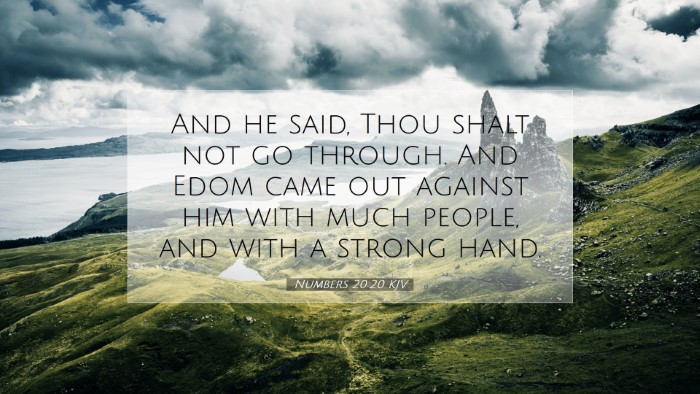Commentary on Numbers 20:20
Verse Context: Numbers 20:20 states, "And he said, You shall not pass through." In this verse, we witness the refusal of Edom to allow Israel to pass through their territory during the Exodus journey. This incident is significant in the overarching narrative of Israel’s wilderness wanderings.
Historical Context
This section of Numbers narrates the later events in the Israelite journey toward the Promised Land. The Israelites, after years of wandering, approached the borders of Edom. The command not to pass through signifies not just a physical obstruction but also mirrors deeper spiritual and relational conflicts arising from Israel's history and God’s covenant with them.
Insights from Matthew Henry
Matthew Henry notes, “The Edomites were the descendants of Esau, and this refusal was an expression of their contempt towards Israel, the descendants of Jacob." He emphasizes the longstanding enmity rooted in the narratives of Genesis, where sibling rivalry turns into national hostility. Henry underscores that the Edomites' response reveals God’s sovereignty over nations and the unfolding of His plans despite human opposition.
Insights from Adam Clarke
Adam Clarke interprets this refusal as indicative of the hard-heartedness of the Edomite people. He suggests that their denial symbolizes spiritual obstinacy, contrasting Israel’s reliance on God for their journey and sustenance. Clarke highlights that Edom's unwillingness to aid Israel speaks to the broader theological reality of nations rejecting God’s people.
Insights from Albert Barnes
Albert Barnes emphasizes the importance of Edom’s refusal in the context of God’s providential care and direction. He views Edom's rejection as a test for Israel, showing their patience and reliance on God rather than on human alliances or paths. Barnes adds that the denial created a condition for Israel to trust solely in God’s guidance, reinforcing the spiritual principle that God often leads His people through trials to strengthen their faith.
Theological Implications
The refusal of Edom to allow Israel passage raises profound theological themes, particularly regarding the nature of divine election and human agency. It presents a scenario where God's chosen people face obstruction due to historical grievances and the consequences of sin. This chapter serves as a reminder of the real and metaphorical challenges believers encounter on their spiritual journeys.
Applications for Pastors and Theologians
- Spiritual Obstacles: Like the Israelites facing Edom’s refusal, believers often encounter barriers in their ministry and personal lives. This serves as a reminder to rely on God in the face of rejection.
- Covenantal Relationships: The relationship between Israel and Edom illustrates the impact of familial and historical tensions on community dynamics and suggests the importance of seeking reconciliation.
- Faith in Trials: The situation encourages a robust faith in God’s promises, asserting that He leads His people through trials for their spiritual growth.
Conclusion
Numbers 20:20 serves as a pivotal moment in the narrative of Israel’s journey. Through the insights provided by public domain commentators such as Henry, Clarke, and Barnes, we uncover layers of historical, theological, and practical meanings. This incident not only highlights Israel's trust in divine leadership but also calls contemporary believers to reflect on their own responses to opposition and adversity. Ultimately, it is a testament to God’s faithfulness amid human rejection.


